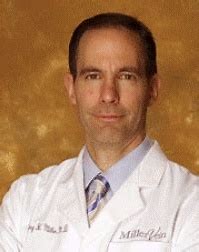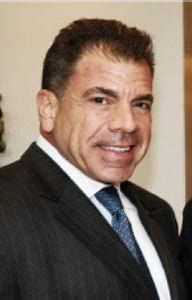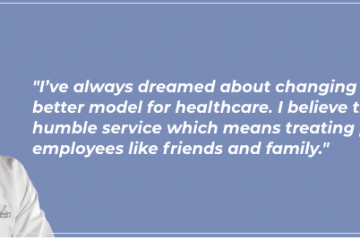HOW PHYSICIANS AND SURGEONS COPE WITH COVID-19
By Robert Jennejohn
 Dr. Michael Y. Shao, MD is a board-certified vascular surgeon with the Swedish Medical Group. He attended the Mount Sinai School of Medicine. He has more than 17 years of experience and is currently affiliated with the Swedish Covenant Hospital in Chicago, Ill. This Interview was conducted in July 2020, via telephone.
Dr. Michael Y. Shao, MD is a board-certified vascular surgeon with the Swedish Medical Group. He attended the Mount Sinai School of Medicine. He has more than 17 years of experience and is currently affiliated with the Swedish Covenant Hospital in Chicago, Ill. This Interview was conducted in July 2020, via telephone.
JENNEJAHN: How do physicians and surgeons cope with the conditions presented by the COVID-19 pandemic?
- SHAO: The venous conditions are “elective procedures” and have a lower priority during this health crisis. Most importantly, the physician works to ensure the safety of the patients.
There are numerous challenges today, within the last few months, due to the pandemic. One of these challenges is working with people who are not “tech-savvy.”
Doctors are using various forms of new technology to ensure the health and safety of their patients.
Here is an example of the technology utilized: Zoom, Apple apps, Android apps, Telehealth, and (Doxy.Me), which is HIPAA-compliant. The method must adapt to the needs of the patient. For example, does the patient have access to a computer? Perhaps they do not own a smartphone or have a computer or state-of-the-art (fast) internet service.
The doctor requires a video to conduct a limited physical examination. Can the patient work with a “screen share” application? The initial visit can be via telephone and then leading up to an in-person visit.
The primary intent is to minimize the risk of exposure to the virus. Examinations of the incision can be conducted visually from a video connection to the web. Therefore, the initial visits can be conducted via a slide presentation and a video. This method allows the surgeon to utilize visual aids to show the devices to be used during the surgery. However, it is much harder to conduct a thorough examination because the physician is unable to feel the area of the incision. In addition, the video might have poor resolution due to the internet connection or the phone service provider. These are some of the challenges that the surgeon faces during this pandemic.
In the doctor’s office there are various new health and safety procedures to be followed, such as wearing masks and gloves, sanitizing all surfaces, social distancing, etc. Many patients have an ultrasound procedure performed.
Patients are tested for COVID-19 within 72 hours after the procedure, as a follow-up precaution.
JENNEJAHN: What are some of the things that patients can do to boost and improve their immune systems to prevent contracting the COVID-19 virus?
- SHAO: I would recommend the following:
- Daily exercise
- Vitamin supplements (i.e. C, D, zinc)
- Meditation
- Fresh air and sunshine
- No use of tobacco products or vaping items
- Moderate consumption of alcohol
- Improving family relationships
- Counseling for stress management and anxiety
The doctor discussed the fact that the medical community is urgently seeking a vaccine for the COVID-19 virus.
 Interview with Jeffrey H. Miller, M.D., located in Michigan. Dr. Miller owns and operates Miller Vein Therapy, (www.MillerVein.com)
Interview with Jeffrey H. Miller, M.D., located in Michigan. Dr. Miller owns and operates Miller Vein Therapy, (www.MillerVein.com)
JENNEJAHN: How do physicians and vein surgeons cope with the conditions presented by the COVID-19 pandemic?
MILLER: We decided to close all our offices just hours before our governor mandated it. Officially, medical offices were not allowed to perform elective procedures. We created an emergency team to cover the offices for urgent ultrasounds for example, to “rule out DVT.” We did conduct a handful of DVT studies to take care of patients so that they would not have to go to the ED. Otherwise, nobody was working until we reopened on May 18, 2020. Even if the governor had not declared the lockdown, we would have closed. Our staff was starting to get a little uncomfortable with the unknown. We noticed that while all our scheduled appointments were kept, our new patient volume was plummeting. It did not make any sense to remain open. When the decision was made to furlough everyone, we gathered as much information for the teams regarding what was required for unemployment benefits, so that the process was as smooth as possible. We also knew that supplies were going to be difficult to obtain. Once we closed, we went through each office and gathered up supplies to donate, for example, items such as: masks, gloves, gowns, shoe covers, cleaning and sanitizing supplies. We delivered many of these supplies to the local fire departments and emergency rooms.
We are very proud of our teams who filled out the volunteer paperwork for the state to help in hospitals and nursing homes.
The CARES Act helped my employees tremendously. They were able to continue to pay their mortgages, rent, bills, etc. We made certain to continuously communicate with our employees to see if they had any immediate financial needs or other concerns. We set up an internal site to keep the whole team up to date on any important information that they may have needed. During the first week of closure I called each teammate and had one-on-one conversations to make sure all was well. My operations director, Melissa Gula, was in constant contact with everyone in the company throughout the closure. The rest of my back office also stepped up. Our communications director, Hannah, made sure all phone calls were returned. Our director of IT, Nick, kept working on his special projects while our bookkeeper, Linda, made sure the bills were paid. The list goes on and on. We offered financial aid to any team member who needed extra money to help them through. Miller Vein also continued to pay for all full-time staff’s health insurance.
We had weekly team meetings, via Zoom, to check in with each other.
Although people were itching to get back to work after a few weeks, I think we all took solace in the fact we were able to spend quality time with our families. Obviously, it was incredibly upsetting to see how many people were affected by this deadly disease. One of our employees lost her aunt, a frontline nurse in a large hospital, to COVID-19.
Operationally we are following CDC guidelines, including:
- We have altered our offices to ensure social distancing guidelines and removed all magazines, fruit, and any other potential germ carriers.
- We confirm that all working employees are feeling 100% well and are temperature-checked daily.
- We are cleaning and disinfecting frequently touched objects and surfaces throughout the day (e.g. computers, doorknobs, keyboards, desks, countertops, phones, coffee makers)
- Every examination room is thoroughly cleansed between patients.
- Our teammates utilize thorough hand washing and/or hand sanitizer before and after every patient encounter.
- We provide patients with hand sanitizer and face masks (if they do not have one) when they enter our office.
- We always perform any necessary procedures using sterile techniques.
- We send patients home and will reschedule their appointments if they have any COVID-19 symptoms.
- To limit patient-to-patient contact, we have patients wait in their cars until we are ready for them. We also request that patients do not bring family members with them to their appointments, and we are walking patients out to their vehicles after their procedures.
- We offer each patient a new pen for their use throughout their visit and to take with them.
- We have educational signs throughout the offices (hand washing, mask wearing, signs and symptoms, social distancing).
- All team members completed online COVID-19 training.
- We continue to request that all those employees who are able to, work from home.
- We have allowed some team members to remain on unemployment benefits, due to personal health concerns.
- We delayed the restart of cosmetic procedures and for several weeks only treated patients who were determined to be “medically necessary.”
Miller Vein continued to pay for the health insurance of all our employees to make sure everyone was taken care of during unemployment. In addition to our in-office COVID-19 precautions, every patient is given a personal phone call to screen for symptoms and exposure by a friendly and helpful team member.
Miller Vein adhered to the Governor’s Executive Order: 2020-17. For example:
To mitigate the spread of COVID-19, protect the public health, provide essential protections to vulnerable Michigan citizens, and ensure the availability of health care resources, it is reasonable and necessary to impose temporary restrictions on non-essential medical and dental procedures.
Acting under the Michigan Constitution of 1963 and Michigan law, I order the following:
Beginning as soon as possible but no later than March 21, 2020 at 5:00 pm, and continuing while the state of emergency declared in Executive 2020-4 is in effect, all hospitals, freestanding surgical outpatient facilities, and dental facilities, and all state-operated outpatient facilities (collectively, “covered facilities”), must implement a plan to temporarily postpone, until the termination of the state of emergency under section 3 of Executive Order 2020-4, all non-essential procedures (“non-essential procedure postponement plan” or “plan”). For purposes of this order, “non-essential procedure” means a medical or dental procedure that is not necessary to address a medical emergency or to preserve the health and safety of a patient, as determined by a licensed medical provider.
Dr. Jose Almeida, MD, FACS, RPVI, RVT is a veteran academic vascular surgeon who practices endovascular venous surgery in the comfort and convenience of a private practice in Miami, Fla.
 Dr. Almeida finished his general surgery residency at the University of Miami-Jackson Memorial Hospital in 1996 and fellowship in vascular surgery at the University of Missouri-Columbia in 1998. He is a Diplomate of the American Board of Surgery in both Vascular Surgery and General Surgery. He is a Fellow of the American College of Surgeons and Distinguished Fellow of the American Venous Forum.
Dr. Almeida finished his general surgery residency at the University of Miami-Jackson Memorial Hospital in 1996 and fellowship in vascular surgery at the University of Missouri-Columbia in 1998. He is a Diplomate of the American Board of Surgery in both Vascular Surgery and General Surgery. He is a Fellow of the American College of Surgeons and Distinguished Fellow of the American Venous Forum.
From 1998-2002 he was in practice at the Miami Cardiac and Vascular Institute, internationally recognized for its pioneering endovascular solutions to complex vascular problems. In 1999 he began to focus on venous disease and in 2002 limited his practice to venous surgery. In 2003, he introduced the International Vein Congress (IVC) – a global educational forum in venous disease management. He is the author and editor of the Atlas of Endovascular Venous Surgery textbook published in 2002.
Dr. Jose Almeida serves as Voluntary Professor of Surgery at the University of Miami School of Medicine, sits on the American Venous Forum Board of Directors, and is Chairman of the Society for Vascular Surgery Patient Safety Organization Venous Quality Committee.
JENNEJAHN: How do physicians and surgeons cope with the conditions presented by the COVID-19 pandemic?
ALMEIDA: In March 2020, the governor had issued a stay-at-home order. The city of Miami, Fla., was closed down. The key issue was hospital capacity and limited availability of PPE (person protective equipment). We realized that New York City was the epicenter of the pandemic and used this case as an example. Elective surgery was effectively shut down. I also have an academic position, and teaching was affected.
This pandemic made the medical practice suffer financially, and there was stress and anxiety. In May 2020, elective surgery was allowed to resume. Now, in July 2020, Miami is the new epicenter for the virus. Therefore, all new elective surgery has been forced to cease. Patients are frightened, and procedures such as colonoscopy have had to be postponed. Telemedicine such as Zoom meetings are not as effective as in-person consultations. That would include virtual conferences. An ultrasound must be conducted to determine a DVT, for example. Vein Global (CDC Guidelines) must be followed. It is mandatory that in-person testing at a hospital must be performed prior to any procedures being performed. Specific CDC procedures must be performed, such as disinfecting, sterile techniques, masks, gloves, social distancing, etc.
JENNEJAHN: What are some of the things that patients can do to boost their immune systems and prevent the contraction of COVID-19?
ALMEIDA: There are many habits that people can seek to increase their immunity. Most professionals recommend the following: weight management, exercise, healthy diet, adequate sleeping habits, no use of tobacco or vaping products, moderate consumption of alcohol, etc. In addition, following the CDC Guidelines; social distancing, wearing masks, washing hands frequently, not touching the face, etc.




